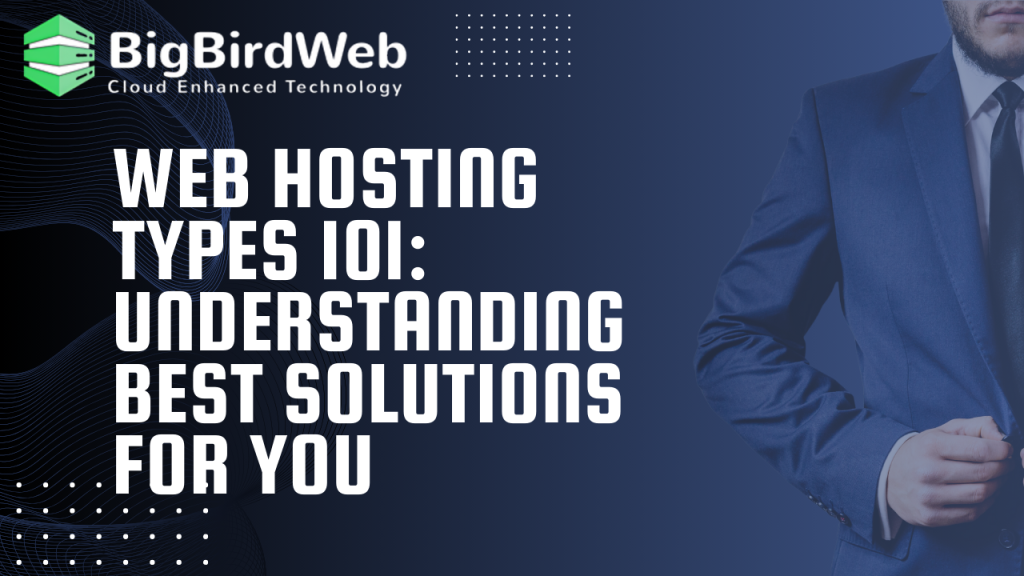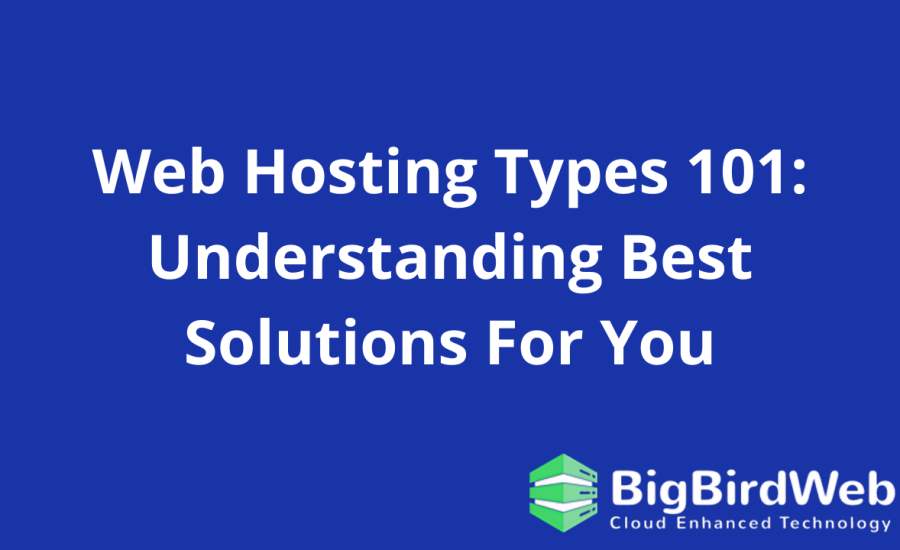Understanding Different Types of Web Hosting
When establishing an online presence, one of the first decisions you’ll face is choosing the right web hosting types for your website. Selecting the appropriate hosting type is crucial because it affects your site’s performance, scalability, and reliability. This guide will help you understand the various web hosting types available, so you can make an informed decision that best suits your needs.
Table of Contents

Shared Hosting
Shared hosting is the most basic and affordable option among the web hosting types. In shared hosting, multiple websites share the same server and its resources, such as CPU, RAM, and disk space. This type of hosting is suitable for small businesses, personal blogs, and startups that do not expect high traffic.
Pros:
- Cost-effective: Shared hosting plans are generally the cheapest, making it an ideal choice for beginners. You can also opt for free web hosting.
- Easy to use: Most shared hosting providers offer user-friendly control panels and one-click installations for popular CMSs like WordPress.
Cons:
- Limited resources: Sharing server resources with other Web Hosting Types can lead to performance issues if one site experiences a traffic spike.
- Less control: Limited server access means fewer customization options for advanced users.
VPS Hosting

Virtual Private Server (VPS) hosting provides a middle ground between shared and dedicated hosting. In VPS hosting, a single physical server is divided into multiple virtual servers, each with its own resources and operating system. This setup offers better performance and more control than shared hosting.
Pros:
- Enhanced performance: With dedicated resources, your website experiences fewer slowdowns.
- Greater control: VPS hosting offers root access, allowing you to customize server settings and install software as needed.
Cons:
- Higher cost: VPS hosting is more expensive than shared hosting.
- Technical knowledge required: Managing a Web Hosting Types can be complex, requiring a certain level of technical expertise.
Dedicated Hosting

Dedicated hosting provides an entire server exclusively for your website. This is the most powerful option among the web hosting types, offering unparalleled performance, control, and security. It is ideal for large businesses, high-traffic websites, and resource-intensive applications.
Pros:
- Superior performance: With no sharing of resources, your website can handle high traffic and intensive tasks seamlessly.
- Complete control: Full server access allows for extensive customization and optimization.
Cons:
- High cost: Dedicated hosting is the most expensive option.
- Management complexity: Requires technical expertise to manage and maintain the server.
Cloud Hosting
Cloud hosting utilizes a network of virtual and physical servers to host Web Hosting Types. This type of hosting offers excellent scalability and reliability, as resources can be adjusted on-demand based on your website’s needs.
Pros:
- Scalability: Easily scale resources up or down to handle traffic fluctuations.
- Reliability: With multiple servers, your site remains online even if one server fails.
Cons:
- Variable cost: Pricing can fluctuate based on resource usage, potentially leading to higher costs during traffic spikes.
- Complexity: Managing cloud hosting can be complex, requiring technical knowledge for Web Hosting Types.
Managed Hosting

Managed hosting refers to a hosting plan where the provider takes care of server management, including maintenance, updates, and security. This option is ideal for those who prefer to focus on their website’s content and business rather than technical details.
Pros:
- Hassle-free management: The hosting provider handles all technical aspects, saving you time and effort for Web Hosting Types.
- Enhanced security: Providers often include advanced security features and regular updates.
Cons:
- Higher cost: Managed hosting plans are generally more expensive due to the added services.
- Less control: With the provider handling server management, you may have limited access to certain settings and configurations.
WordPress Hosting
WordPress hosting is specifically optimized for WordPress websites. This type of hosting often includes features like one-click WordPress installation, automatic updates, and enhanced security tailored for the WordPress platform.
Pros:
- Optimized performance: Hosting environments are fine-tuned for WordPress, ensuring faster load times and better performance.
- Ease of use: Includes features like pre-installed themes and plugins, making it easier to set up and manage a WordPress site.
Cons:
- Limited to WordPress: This type of hosting is only suitable for WordPress websites.
- Higher cost: Specialized hosting often comes at a premium price.
Reseller Hosting

Reseller hosting allows you to purchase hosting services and resell them to your clients. This type of hosting is suitable for entrepreneurs and web developers who want to offer hosting services as part of their business.
Pros:
- Business opportunity: Generate revenue by reselling hosting services.
- Scalable plans: Start small and scale up as your client base grows.
Cons:
- Responsibility: You are responsible for providing customer support to your clients.
- Management complexity: Managing multiple accounts can be challenging and time-consuming.
Key Factors to Consider When Choosing a Web Hosting Type
1. Performance and Reliability
Your hosting type should offer high uptime and fast loading times. Ensure the provider guarantees at least 99.9% uptime and uses SSD storage for quicker data retrieval.
2. Scalability
Choose a hosting type that can grow with your website. If you anticipate rapid growth or seasonal traffic spikes, consider cloud or VPS hosting for easy scalability.
3. Security Features
Security should be a top priority. Look for hosting types that offer SSL certificates, regular backups, firewalls, and malware scanning to protect your website.
4. Customer Support
Reliable customer support is essential, especially if you’re new to web hosting or encounter technical issues. Opt for a hosting type that includes 24/7 support via multiple channels like live chat, phone, and email.
5. Cost and Value
While budget is important, don’t compromise on quality. Evaluate the features and resources included in the hosting type to ensure you’re getting good value for your money.
6. Control and Customization
Depending on your technical skills and website requirements, you may need different levels of control. VPS and dedicated hosting offer more customization options, while managed hosting handles the technical details for you.
7. Specific Requirements
Consider any specific needs your website may have. For example, if you’re running an e-commerce site, you’ll need a hosting type that supports secure payment processing and offers enough resources to handle traffic surges.
FAQs about Web Hosting Types
1. What are the different types of web hosting?
There are several web hosting types, including shared hosting, VPS hosting, dedicated hosting, cloud hosting, managed hosting, WordPress hosting, and reseller hosting.
2. Which web hosting type is best for beginners?
Shared hosting is the best choice for beginners due to its affordability and ease of use.
3. What is the difference between VPS hosting and dedicated hosting?
VPS hosting provides a virtualized environment with dedicated resources on a shared server, while dedicated hosting offers an entire server exclusively for your website, providing the highest performance and control.
4. How does cloud hosting differ from other web hosting types?
Cloud hosting uses a network of virtual and physical servers, offering high scalability and reliability, unlike traditional hosting, which relies on a single server.
5. What is managed hosting?
Managed hosting is a service where the hosting provider takes care of server management, maintenance, and security, allowing you to focus on your website content and business.
Bonus Content: Tips for Choosing the Right Web Hosting Provider
- Research and Reviews: Look for reviews and testimonials from current users to gauge the reliability and performance of the hosting provider.
- Trial Periods and Money-Back Guarantees: Many hosting providers offer trial periods or money-back guarantees, allowing you to test their services risk-free.
- Upgrade Options: Ensure the hosting provider offers easy upgrade options, allowing you to scale your resources as your website grows.
- Control Panel: Choose a hosting provider with a user-friendly control panel, such as cPanel or Plesk, to simplify website management tasks.
- Backup Services: Look for providers that offer regular automated backups to protect your data in case of an emergency.
In conclusion, understanding the various web hosting types is crucial for selecting the right solution for your website.
